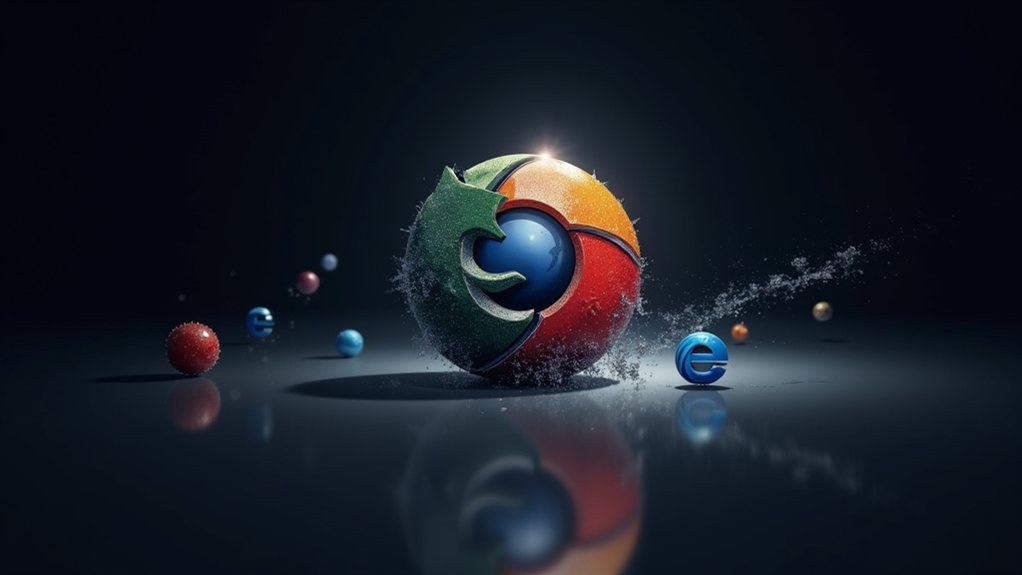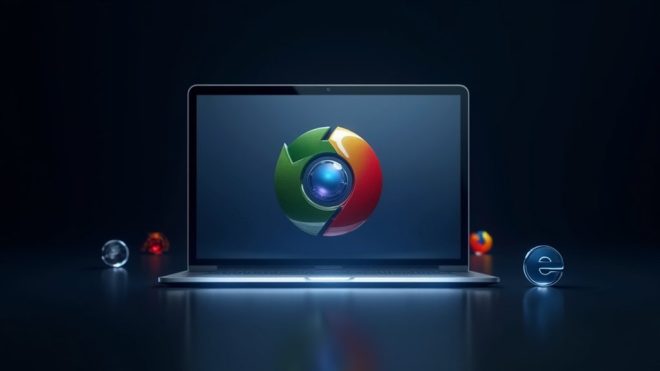Chrome’s Dominance Surges Beyond 70%: An Unmatched Reign
Chrome has eclipsed 71% of the global browser market share, leaving competitors like Safari and Firefox gasping for breath. With over three billion users, Chrome’s speed and extensive extension ecosystem keep it ahead of the pack. Experts say its default status on most Android devices plays a vital role in this staggering ascent. As regulatory hurdles loom, can Chrome maintain this iron grip? The battle for browser supremacy is far from over.

As of August 2025, Chrome has officially eclipsed the 70% threshold in global browser market share, a remarkable feat that highlights its unwavering grip on the online environment. With an approximate 71% of users traversing the web through Chrome, the browser has cemented its position as a digital titan, dwarfing competitors and forging ahead into uncharted territory. The sheer dominance is staggering, considering that its nearest rival, Safari, trails with just 15-19%. In a world where attention spans shrink faster than the file size of a low-res meme, Chrome retains an enviable focus from the global user base.
Chrome’s ascent can be traced back to several factors that intertwine seamlessly. The browser is the default on nearly 71% of smartphones worldwide, thanks to its pre-installation on Android devices. It’s a bit like being the only game in town—once someone moves in, they rarely leave. The speed, security, and clean user interface of Chrome provide the right hooks to keep users coming back for more, as its vast web extensions ecosystem delivers that cherry-on-top customization. With approximately 3.45 billion users relying on Chrome around the globe, its influence continues to expand. Moreover, over 87% of developers utilize Chromium-based environments for testing, giving them an edge with early access to new technologies.
Developers, too, often prioritize Chrome for their projects, recognizing the benefits of early access to cutting-edge web technologies that keep their work in the competitive game. Despite the prevalence of mobile devices, where Chrome holds a commanding 66.7% market share, the browser isn’t neglecting its roots on desktop systems. Maintaining around 65.7% share of desktop usage, Chrome stands as a steadfast desktop companion for many and captivates users on different platforms—from laptops to tablets.
The shift between devices becomes fluid, aided by Chrome’s cross-platform syncing capabilities that allow users to float between their Gmail, Google Drive, and browsing activities with the ease of flicking a switch. Yet, as Chrome garners acclaim, it faces a myriad of regulatory challenges. Issues surrounding privacy and data security loom large—concerns murmuring in the ears of users worldwide. Recent scrutiny could disrupt the crisp momentum that has been cultivated for so long.
Could these factors finally tip the scale in favour of its less celebrated competitors, like Microsoft Edge or Firefox? It seems unlikely, though the situation is worth keeping a watchful eye on. This upward trend probably won’t fizzle out anytime soon. With 5.5 billion global internet users, and as many as 2 billion regularly opting for Chrome, the sheer numbers indicate a commanding presence that rivals simply cannot match.
Chrome’s future remains bright, but the journey ahead resembles an intricate ballet on a global stage—a performance where the competition lingers in the shadows, keenly aware of the technological juggernaut that continues to thrive, bloom, and, most significantly, dominate. As Chrome leans into its unrivalled market share with pencil-thin margins of its competitors, one has to wonder—how will this browser battle unfold in the years ahead?
Final Thoughts
As Chrome dominates over 70% of the browser market, its competitors are struggling to stay relevant in a landscape where speed and security are key. Users are increasingly drawn to Chrome’s extensions and seamless integration, making it a go-to choice. As we move further into a browser-centric future, the question remains: can any rival challenge this digital giant?
The Emotional Computer team can assist your company in navigating this competitive landscape by enhancing user engagement and experience. Don’t get left behind—click on our contact us page to get in touch and explore how we can help you stand out!

